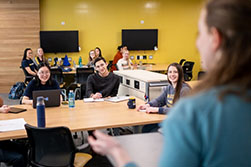The Rackham School of Graduate Studies and the Center for Research on Learning and Teaching (CRLT) are excited to invite applications for the "Preparing Future Faculty" (PFF) seminar. PFF is a nationally-recognized program designed to help prepare doctoral candidates across disciplines for the academic job search and success in their subsequent faculty positions.
Read below for reflections from past PFF participant and current PFF program assistant, public policy and sociology doctoral candidate Kennedy A. Turner.
For more information about the program and application process, click here: http://crlt.umich.edu/programs/pffseminar. Applications are due March 1.

I know that many of my peers have similar origin stories, of an engaging professor who inspired them to pursue academia in the first place. Yet, the goal of becoming an engaging professor ourselves can easily get lost under the weight of courses, research obligations, and that whole “writing a dissertation” thing. Like research, writing, and other aspects of the job, teaching is a skill that can be learned and cultivated if taken seriously.
That is why I found the the Preparing Future Faculty (PFF) seminar to be such a rewarding experience. PFF is a place to gain important skills, connect with others who are passionate about teaching, and have structured time to prepare for the teaching aspects of being a professor. Whereas there are many opportunities in graduate school to hone your research skills, it can be much more difficult to learn and discuss evidence-based teaching techniques and practices. PFF provided this by modeling successful classroom strategies and introducing ways to design courses that are linked to your course objectives.
Another highlight of the program was the chance to be around committed teachers from other disciplines and departments. Hearing about the classrooms and learning objectives in other fields allowed me to seriously consider the unspoken norms and goals of my own Sociology classrooms. What could the Sociology curriculum learn from the design of engineering courses? Interacting with PFF participants raised these questions for me, and wrestling with them helped make me a better instructor. This training will also be helpful when I am asked to develop and shape departmental curriculum and policy as a faculty member.
PFF also helped demystify several aspects of faculty life at different types of institutions. When I entered PFF, I had a sense that I wanted to be a tenure-track faculty member, but was not fully aware of the differences between institutions. Through the campus visit, faculty panels, and other activities, I learned about organizational structures beyond the schools I have personally attended. This has been invaluable as I narrow my career goals.
After one month of participating in PFF, I had a solid working draft of a teaching statement, a syllabus of a course that I hope to someday teach, new skills in course and classroom management, and a stronger sense of the type of job I hope to have. In so many ways, PFF renewed my passion for teaching and gave me skills to be more like the faculty members who inspired me to pursue a PhD in the first place.
Image credit: Kennedy A. Turner
- Log in to post comments
- 18 views






